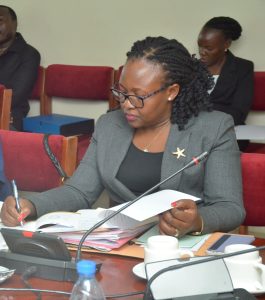Members of Parliament (MPs) have decried the proposals in the Judicature Amendment Bill 2023 noting that they are a burden to the taxpayers.
Ministry of Justice and Constitutional Affairs, Judicial Service Commission, Uganda Law Society, Uganda Law Reform Commission, Law Development Centre, Judiciary, Director of Public Prosecution were among the institutions that interfaced with the MPs to give their views and opinions over the Bill.
The Legal and Parliamentary Affairs Committee is required to report back to Parliament on November 28, 2023 for MPs to take a final decision on the matter.
However, the MPs led by Hon Abdu Katuntu (Bugweri County) have warned that the move by Government to bloat the Supreme Court with 21 Justices and Court of Appeal with 55 justices, will see taxpayers pay a whooping Sh37Bn ($10m) in salaries and other emoluments in the mid-term.

Katuntu says this expenditure is unsustainable in Uganda.
He made a comparison of 12 nations whose GDPs and populations are higher than Uganda, but most had fewer ratios of justices at the Supreme Court as compared to their people, wondering what was unique about Uganda to want a bloated Supreme Court.
“What is this uniqueness you are telling me? I have been waiting for it, that Uganda is such a unique country and needs a bloated Supreme Court. What is this uniqueness that is different from Kenya, Tanzania, United Kingdom, Unites States, South Africa?” a furious Katuntu asked.
Katuntu added that creating a bill of $10m annually would be a great burden to the taxpayers.
“Judges should be doing their job, they should be more efficient and more effective. You don’t know how many mothers are dying while giving birth up to today. And instead, we are allocating the meagre resources in areas where we think we can work differently and we achieve the same results,” added Katuntu.
Pamela Tibihikirra, the Chairperson Uganda Law Reform Commission backed the proposal to increase the number of Justices at the supreme court, but asked Parliament to ensure that the Judiciary justifies the numbers.
“We do agree with you entirely that we need to increase the numbers entirely, but in a manner that should be justifiable given our population size and look at other ways of handling case backlog. Is the answer to case backlog more judges, is that the only answer?,” asserted Tibihikirra.

She called for a deeper interrogation on what the increment will mean for Uganda’s budget, given that recently, salaries of Judicial officers were enhanced in a package that left Justices of Supreme Court walk away with heft retirement packages.
“Perhaps there are other ways of handling backlog because increasing judges comes with a hefty bill. The Administration of Justice Act 2020 might have given the Judiciary more resources, but they also come with a charge on the consolidated fund. So we need to balance our numbers very well because the package is very good and it extends to retirement as well. In principle, we agree with the increase of numbers but we need to think through if these are the actual numbers that we need,” added Tibihikirra.
The Chief Registrar, Sarah Langa said the Justices at the two courts were last increased in 2011 and the new changes will see Judges at Supreme Court sit in three panels while 40 Justices of court of appeal will be deployed at regional levels of; Mbarara, Gulu, Mbale, Jinja, Arua, Fort Portal, Masaka and Soroti.

She added that the 15 Justices will be retained at Court of Appeal in Kampala.
“The increase in the number of Justices will tremendously improve on the number of cases handled and completed by the three panels which will eliminate the case backlog. These will serve the people of Uganda better and the cases will be concluded in a timely manner which will also build investor confidence in the judicial system, and therefore boosting the economic growth of the country,” said Langa.







